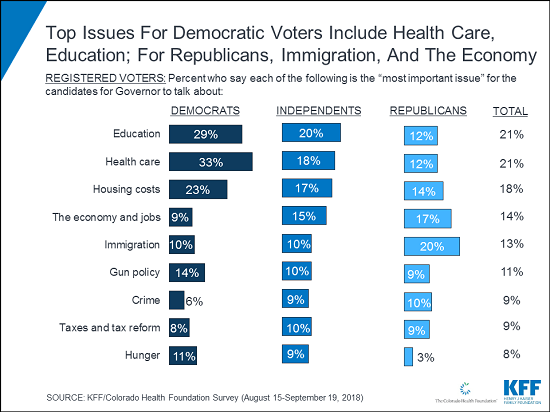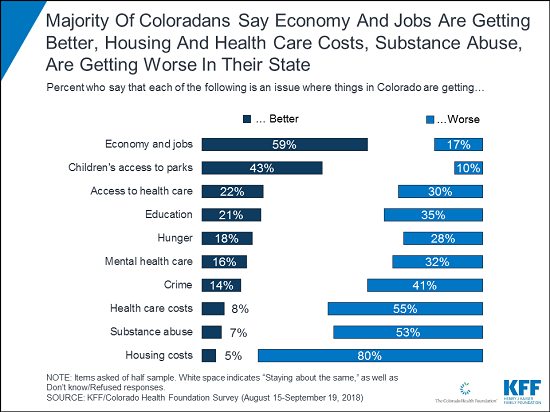
The independent source for health policy research, polling, and news.
Poll: Colorado Voters’ Top Issues for Gubernatorial Race Are Education, Health Care and Housing
Most Residents See the State’s Economy as Improving, But View Health Care and Housing Costs as Getting Worse
Colorado voters most often cite education, health care and housing costs as the top issues for the state’s gubernatorial candidates to discuss ahead of the November elections, finds a new Kaiser Family Foundation/Colorado Health Foundation (KFF/CHF) poll.
The poll of more than 1800 residents reveals Coloradans’ views on a wide range of issues leading into the 2018 midterm elections and highlights differences related to health and quality of life among key demographic subgroups, including geography, income, race/ethnicity and partisan identification.
Among voters, about one in five cite each of education (21%), health care (21%), and housing costs (18%) as a top issue in the gubernatorial race. Fewer voters cite economy and jobs (14%), immigration (13%), gun policy (11%), crime (9%), taxes and tax reform (9%), and hunger (8%) as top issues.
The poll shows a partisan divide over the importance of health care, as seen nationally in other KFF polls. Republicans are least likely to say health care is the most important issue (12%), ranking the issue tied with education as fourth behind immigration, the economy and jobs, and housing costs. A third of Colorado Democratic voters (33%) say health care is the most important issue, making it their top issue, and nearly one in five independents (18%) rank health care as their most important issue, ranking second just behind education.
When voters who say health care is an important issue are asked what specifically about health care they would like the candidates to discuss, four in ten Colorado voters (41%) cite health care costs – at least four times as many as name any other health care issue.
“For Colorado voters, affordable housing and education are right up there with health care as top issues in the governor’s race,” KFF President and CEO Drew Altman said. “One lesson is that top issues in state elections often can look quite different than in national polls, though health care emerges among the top tier in both.”
The poll suggests Colorado Democrats are more motivated to vote in November’s Congressional elections than others. Nearly half (49%) say they are “more enthusiastic” about voting in the Congressional elections this year, compared to about three in 10 Republicans (29%) and independents (31%).
For many Colorado voters, President Trump could play a significant role in the election. More voters say that a candidate’s support for or opposition to President Trump is the biggest factor in their Congressional vote (29%) than say the same about a candidate’s character and experience (23%), local or state issues (24%), or specific national issues (19%).
Coloradans See Housing Costs, Substance Abuse and Health Care Costs Getting Worse
Overall Coloradans are optimistic about the state’s economy and job market, with six in 10 (59%) saying the economy is getting better in the state. On the other hand, most Coloradans say that housing costs (80%), health care costs (55%), and substance abuse (53%) are getting worse.
When asked about a series of priorities for state government, residents rank health care costs at the top of the list. Eight in 10 (80%) cite lowering what people pay for health care as at least “very important” for the state government to address.
Seven in 10 say the same about making housing more affordable (69%) and funding mental health programs (70%). Fewer, but still a majority, say so about programs to address hunger (62%), substance abuse treatment and prevention (58%) and programs to help children be physically active (52%).
Health care costs rank among the top state government priorities across most demographic groups in Colorado. Notably, however, half (52%) of Black residents and one-third (33%) of those with incomes less than $40,000 name housing costs as their top priority.
Three in 10 Coloradans Worry about Losing Their Home Due to Its Cost
Half of Coloradans report that it has become harder for residents to afford their rent or mortgage in recent years (52%). In addition, nearly three in 10 (28%) say they worry that they might lose their home because they can’t afford their monthly payments, including one in eight (12%) who are “very worried.”
These housing worries are worse among residents in the Denver/Boulder area, where two thirds (65%) of residents say it has become more difficult to afford their rent and mortgage costs, and about a third (35%) worry about losing their home because they can’t afford their monthly payments.
Most Coloradans Report Being in Excellent or Very Good Health, But There is Significant Variation by Income
The survey finds most Coloradans say that their health (53%) and mental health (64%) are “excellent” or “very good,” with variations by income and race/ethnicity.
For example, fewer than half of those earning less than $40,000 report that their general health (38%) or their mental health (47%) is “excellent” or “very good,” compared to majorities of those with higher incomes. Black and Hispanic residents are also less likely than Whites to report “excellent” or “very good” health overall. There is little variation by region.
“Not every Coloradan feels they and their family can attain a good quality of life, particularly if they are living on lower incomes or are Black or Hispanic. That’s a sign of inequity that is negatively influencing the health of our state overall,” said Colorado Health Foundation President and CEO Karen McNeil-Miller. “Even with an expanding economy, our state’s work of bringing affordable health care and housing within reach for all Coloradans remains unfinished business. Coloradans want and expect the next elected leaders of Colorado to prioritize addressing these challenges.”
Other key findings include:
- Local media are Colorado’s most trusted news source. Seven in 10 (69%) Coloradans say they have at least some trust in local news organizations. Majorities say the same about news from family and friends (60%) and national media organizations (62%). Far fewer trust the information they get from social media such as Facebook or Twitter (18%).
- Coloradans split on how well state’s health system works. While most Coloradans (65%) say their families’ current health care needs are being met, nearly equal shares agree (46%) and disagree (45%) that the state’s health care system is meeting the needs of most Coloradans.
- Most Coloradans view access to mental health services as a problem. Overall six in 10 (61%) say that most people in the state who need mental health services are not able to get them. This includes about half (49%) of all residents who view lack of access to mental health services as a “major problem.”
- Costs and coverage pose barriers to mental health and substance abuse services. One in five Coloradans (20%) say there was a time when they or another family member thought they might need mental health or substance abuse services but did not get them. Many in this group say that they couldn’t afford the cost of treatment and/or that their insurance wouldn’t cover it.
Designed and analyzed by researchers at the Kaiser Family Foundation in consultation with the Colorado Health Foundation, Coloradans’ Perspectives on Health, Quality of Life, and Midterm Elections was conducted by landline and cellular telephone August 15 – September 19, 2018 among a random representative sample of 1,803 adults ages 18 and older living in Colorado. The margin of sampling error including the design effect for the full sample is plus or minus 3 percentage points. For results based on other subgroups, the margin of sampling error may be higher.
Filling the need for trusted information on national health issues, KFF (the Kaiser Family Foundation) is a nonprofit organization based in San Francisco, California.
The Colorado Health Foundation is bringing health in reach for all Coloradans by engaging closely with communities across the state through investing, policy advocacy, learning and capacity building. For more information, please visit www.coloradohealth.org.

